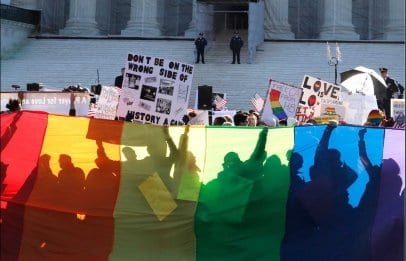“We started with nothing, and look what we have wrought!”
Pioneering gay-rights activist Frank Kameny said this in a 1997 speech and the following years until his death in 2011 saw an even faster pace towards the goal of freedom for the queer people he’d fought for since the 1950s. Historian Lillian Faderman, author of the acclaimed lesbian history Odd Girls and Twilight Lovers in 1991, uses Kameny’s comment to close off her impressive new book The Gay Revolution: The Story of the Struggle, comparing recent victories to the tragic story of University of Missouri professor EK Johnson, who was arrested and hounded out of his job in disgrace for living with his male partner in 1948.

Early chapters feature strange and fascinating stories throughout, like how a new “California Department of Alcoholic Beverage Control” was created in 1955 specifically to allow police to target gay people, revoking a bar’s liquor licence if it was found to be a place were “sexual perverts” congregated. Or the way low-level but ambitious Washington bureaucrat John Peurifoy stoked fears of closeted gay employees in the State Department to rapidly rise through the ranks, eventually becoming solely in charge of “the elimination of Communists and other dubious characters.” There are villains galore in this book.
And there are just as many heroes, like Kameny and the feisty Barbara Gittings, sometimes dubbed the father and mother of the gay-rights movement, and Radical Faerie founder Harry Hay, who was ousted from his own Mattachine Society activist organization by more “pragmatic” gay men. As Faderman writes, in what becomes a recurring theme in her book, “That bitter clash in 1953 — radicals who’d regarded homosexuals as a different species from heterosexuals, versus assimilationists who’s insisted homosexuals and heterosexuals were almost exactly the same — augured the big internal clashes that would divide lesbian and gay communities even into the twenty-first century.”
History tends to repeat, and a section on the backlash against President Jimmy Carter for hosting gay and lesbian activists at the White House is eerie in our current Obama context. Gay rights successes in the 1970s were met by the national “Save Our Children” campaign led by Christian singer and orange-juice hawker Anita Bryant, who claimed that gay rights created a “divine disturbance” in her heart, sounding much like current national homophobe hero Kim Davis. Faderman’s stories prove again and again how every action spawns a reaction and we must keep pushing back against bigotry.

Completed before this summer’s Supreme Court decision making same-sex marriage legal across America, Faderman’s book ends on an obvious but well-earned note of victory (we started with nothing!) but notes the work left to do: “As of January 2015, in eleven states, lesbian or gay couples could marry on Saturday afternoon and be legally fired because of their sexual orientation on Monday morning.” She also notes the rise of “religious exemptions” bills with necessary alarm but echoes Martin Luther King in saying, “it’s undeniable that the arc of the moral universe has been bending toward justice for LGBT people.” In decades to come, Faderman’s massive yet highly-readable tome will show everyone the freedom queer people have wrought.


 Why you can trust Xtra
Why you can trust Xtra


